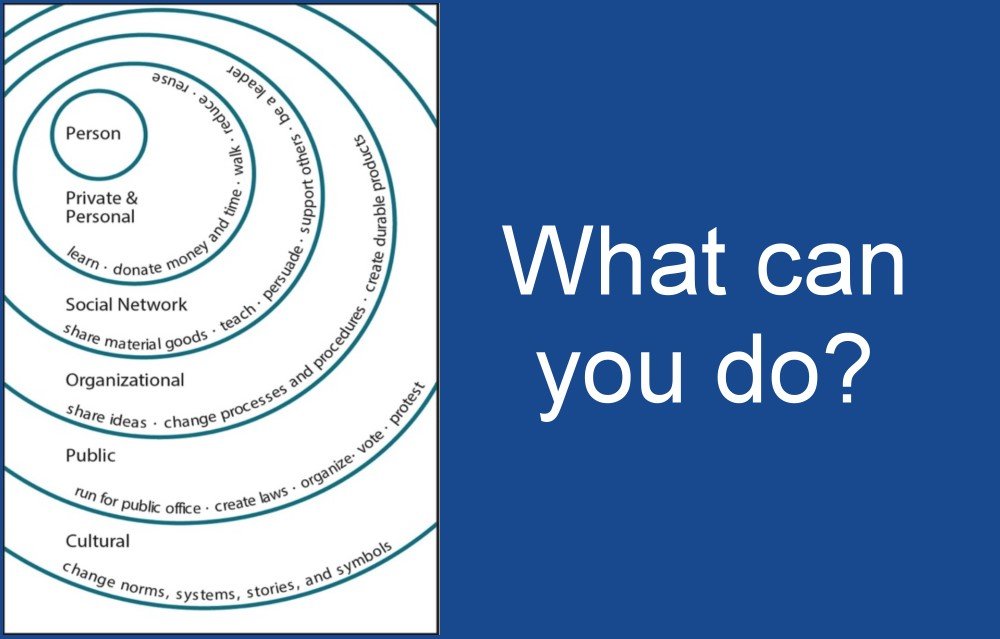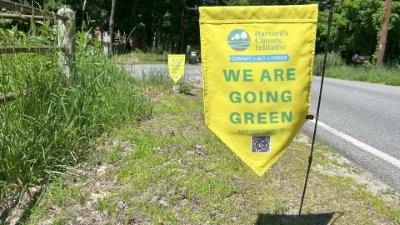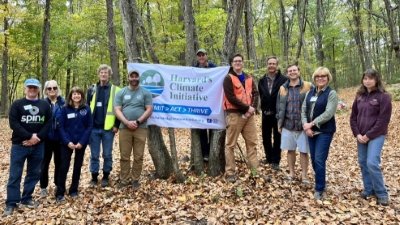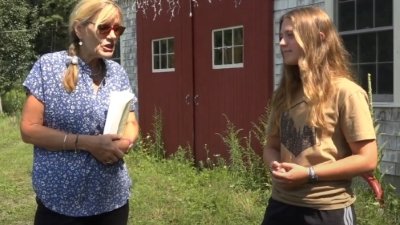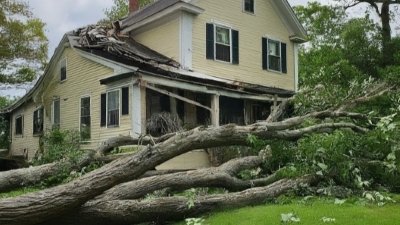STAGING!
What Can One Person Do?
The climate crisis is a defining challenge of our time, one that demands our immediate attention and action. While the consequences of inaction may seem daunting, the urgency of addressing the crisis offers us an extraordinary opportunity to make a positive impact. Embracing renewable energy, reducing emissions, and protecting our natural world not only mitigates the alarming threats we face but also holds the promise of creating a more resilient and prosperous world for generations to come. We all have a stake in this battle, and it’s our collective responsibility to preserve the planet. The climate crisis isn’t just a cause; it’s a call to action.
In association with MassEnergize, our interactive platform HarvardEnergize offers 20 actions you can take to reduce your carbon footprint. On each of the actions, you will find information, step-by-step instructions, and testimonials from others who have taken the action. It’s fast, at your fingertips, and can make a great difference for us today and for future generations.
Overview of the Actions
Heat Pumps for Heating and Cooling your Home
Our buildings in Harvard are responsible for 41% of our greenhouse gases, second only to transportation. One way to have a tremendous impact on your carbon footprint is to convert your heating and cooling systems to heat pumps. These systems are totally electric and thus eliminate fossil fuels. The town’s electricity supply for most residents is also sourced from 100% renewable sources thus increasing the positive impact of heat pump systems. There are both federal and state financial incentive programs that sweeten the deal.
Learn more…
Electric Energy Efficient Appliances
Electrical appliances, particularly refrigerators that run all day and night, clothes dryers and washers, and gas stove tops that harm our health, are all available as efficient electric energy saving models. ENERGY STAR® appliances are independently certified to save energy, save money on electric bills, and protect the climate without sacrificing features or functionality. There are also rebates available from Mass Save.
Learn more…
Advocate for Action
One way to make progress on climate change is to advocate for policy changes at the local, state, national and even international level. Stay informed and participate locally by joining a town committee, such as the Harvard Climate Initiative, to help educate and assist our residents to take action. Or join another town committee to encourage climate impact analysis on proposed policies and activities. At the state and national level, stay informed through any of the multitude of organizations promoting climate policies and be an advocate by reaching out to your legislator representatives.
Learn more…
Carbon Offset for Travel
Air travel produces 2-3% of national carbon greenhouse emissions per year. Carbon offsetting doesn’t get rid of the carbon dioxide which is produced when you fly – that still goes into the atmosphere. What it does is make up for your share of the CO2 which gets released when you fly by reducing it somewhere else instead. There are two main types of offsets. First, forestry projects which either stop existing trees from being cut down or plant new ones. The trees act as a ‘biological sink’ by taking carbon dioxide out of the atmosphere. Second, energy projects which reduce the amount of fossil fuels used by investing in energy-efficient products or renewable technology.
Learn more…
Heat your Water with Solar
Solar hot water systems reduce utility costs and one’s carbon footprint. They require only 2 – 3 solar panels and most homes can find sun facing space for them. A solar hot water system captures heat from sunlight and circulates the thermal energy to the home’s water tank. While they do not fully replace conventional water heaters, they can provide up to 80% of a home’s total hot water needs.
Learn more…
Buy/Lease an Electric Car
Transportation is one of the most damaging contributors to climate change and in Harvard it is the number one producer of greenhouse gas emissions. Electric vehicles, in combination with renewable, carbon-free electricity generation, can dramatically reduce greenhouse gas emissions because they have lower lifecycle emissions than gas-powered cars, even after accounting for extra emissions from battery manufacturing. Federal and state incentives for specific models reduce the purchasing or lease cost for new and used models.
Learn more…
Reduce Wasted Electricity
Devices like phone chargers, computer cords, gaming consoles, DVRs, TVs, and even coffee pots each draw small amounts of power when off, and can together add up to as much as 20-25% of your monthly electricity bill in this ‘standby mode.’ Using smart technologies in addition to being mindful of unplugging unused electronics makes it easier to shave off the ‘standby’ energy.
Learn more…
Invest like a Climate Activist
How can you better align your investments with your beliefs? What if your financial investments do not align with your commitment to sustainability and you are unknowingly supporting the very industries you are fighting against? There is growing interest in Environmental, Social, and Governance (ESG) investing. You can select funds that include one or more areas of focus by deciding what is important to you.
Learn more…
Take an E-bike rather than a Car
Electric bikes offer a cost-friendly, emission-reduced, and health-optimizing option for traveling short distances. Electric bikes offer assisted bike riding. The motors attached to these bikes help propel the vehicle without as much of your body’s power, making for easier rides to your destinations. On one charge, typical electric bikes can go for about 18 miles.
Learn more…
Heat Water with a Heat Pump
When it’s time to replace your hot water heater, consider modernizing to an electric heat pump water heater. Heat pump water heaters extract heat from the air and move it into a tank to heat water. Because they transfer heat instead of generating it, they are highly efficient. As a result, heat pump water heaters are up to 3 times more efficient than electric resistance water heaters thus saving you on electricity costs.
Learn more…
Get Solar for Your House
Over 261 homes and businesses in Harvard have installed solar from 2006 through 2024 and one solar garden has 60 family shares. These are in effect private power plants, collectively generating renewable energy.
Payback! You can often install a system that will pay for itself in 5-12 years if you have a suitable site. After that it’s all positive cash flow as the panels generate power for 25 years or more. It’s like a small 401(k) on your roof! On top of that, solar panels typically increase the value of your home.
Learn more…
Take Advantage of State & Federal Tax Credits and Incentives
Federal tax credits cover up to 30% of the costs of heat pumps, heat pump hot water heaters, battery storage, insulation, solar, windows, home energy upgrades, weatherization, electric cars and more.
Learn more…
Get a No-Cost Home Energy Assessment
Do you want to get rid of energy inefficiencies in your home, cold drafts, moisture or mold? Improve temperature control? Insulate against noise? Address problems with ice dams and other structural concerns? Are you concerned about your home contributing to allergies, asthma, or heat related health issues? Are your energy bills higher than you like? Do you just feel like energy is being wasted and comfort is being compromised, but you don’t know where, or what to do about it?
A Mass Save Home Energy Assessment can help with all those. It’s no-cost and comes with all sorts of savings!
Learn more…
Insulate and Air Seal Your Home
Many of us live in homes built before 1970. If you live in one of these older homes, the insulation in your walls may not meet modern energy efficiency standards. An older home probably has 250% more air leakage than a home built today. That is a lot of cold or hot air sweeping into your home making it uncomfortable and expensive to heat and cool.
How can you tell if your walls are properly insulated and air sealed? Start with a no-cost home energy assessment provided by Mass Save.
Learn more…
Make Magic – Compost
Why compost? (1) It’s magic. (2) It reduces household waste by up to 50% (and makes the trash bin smell way better). (3) Without organic waste in the trash, paper bags work very well to line the bin; this keeps many plastic bags out of landfills and incinerators. (4) Right now, more than half of the trash that ends up in landfills is compostable organic matter that generates methane. (Boo; unburned methane is a greenhouse gas on steroids.)
Learn more…
Transition to a More Plant-Based Diet
Eating meat and dairy products have a critical impact on our climate. Scientists warn that the current system of production and consumption cannot be sustained, with livestock producing about 14.5% of the world’s greenhouse gases each year.
By eating a plant-based diet, we can reduce greenhouse gas emissions and protect the necessary resources we depend on like land and water. Even with little financial investment and going at your own pace, eating less meat and dairy can have a big impact on the climate. By initiating practices like “Meatless Mondays,” starting with less beef, or switching to plant-based alternatives, you can reduce the amount of greenhouse gas emissions you contribute to the environment.
Learn more…
Ecological Landscaping
Suburban lawns contribute significantly to environmental pollution.The fertilizer and lawn chemical industry contributes significantly to greenhouse gas emissions. In 2020, gas-powered lawn and garden equipment alone released over 30 million tons of carbon dioxide into the atmosphere nationwide.
However, yards also offer an opportunity to make a positive impact. Prioritizing native plants and trees in your yard or garden benefits the soil, helps control pest populations, and provides habitat and food sources for wildlife by providing the biodiversity lacking in a traditional lawn. Trees also remove carbon dioxide from the atmosphere and cool the environment.
Learn more…
Switch to Electric Lawn Equipment
Tired of your noisy and smelly lawnmower or string trimmer? Try replacing your gas powered lawn equipment with electric powered, battery operated machinery.
An estimated 121 million pieces of gas powered lawn equipment are used each year in the United States, representing a significant source of local pollution and greenhouse gas emissions. Many of the lighter products like push mowers, tillers, and leaf blowers use the two stroke engine which is especially harmful because they do not burn all the fuel within the engine itself — instead, they throw out a lot of the unburned lubricating oil which is very inefficient and polluting.
Do yourself and your neighborhood a favor and use electric equipment and hand tools rather than the loud gas guzzlers!
Learn more…
Buy Food from a Local Farm
Harvard has over 50 small farms. The three biggest, Carlson’s, Doe and Westward, have about 500 acres of agriculture. The rest, mostly small farms of 10 acres or less, account for 1000 acres. Preserving our farms means less housing development, less trees removed, less driving to buy farm products and less of a carbon footprint. By supporting our local farms we are not only maintaining the character of our town, we are helping our neighbors and reducing our carbon footprint. Many of our farms offer unique products, organic produce, and good conversation.
Consider joining a farm that offers Community Supported Agriculture (CSA). Harvard has at least one CSA.
Learn more…
Convert to LED Lighting
Lighting accounts for about ten percent of the electricity use in the average U.S. home. It’s easy to switch to LEDs (Light Emitting Diodes). LEDs are inexpensive, last a lot longer, and give excellent light. They come in a wide variety of styles, shapes, and sizes for many applications, including both indoor and outdoor lighting, and are often compatible with dimmers, motion detectors, and daylight sensors.
If every household replaced just one light bulb with an LED we would save enough energy to light two million homes for a whole year and we would also prevent greenhouse gas emissions equivalent to that of taking 550,000 vehicles off the road.

